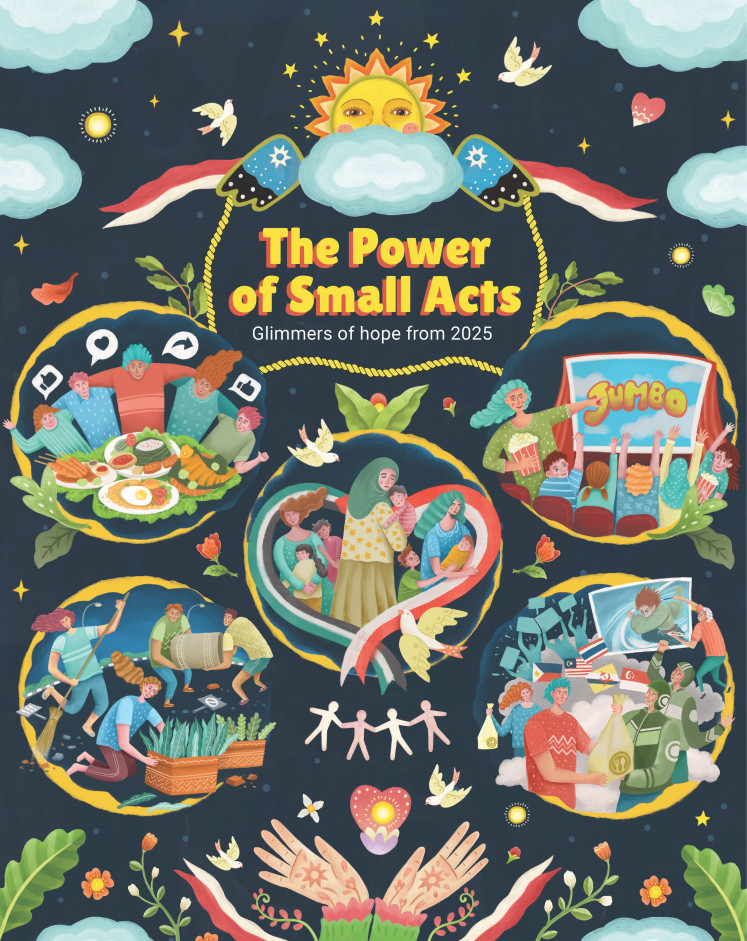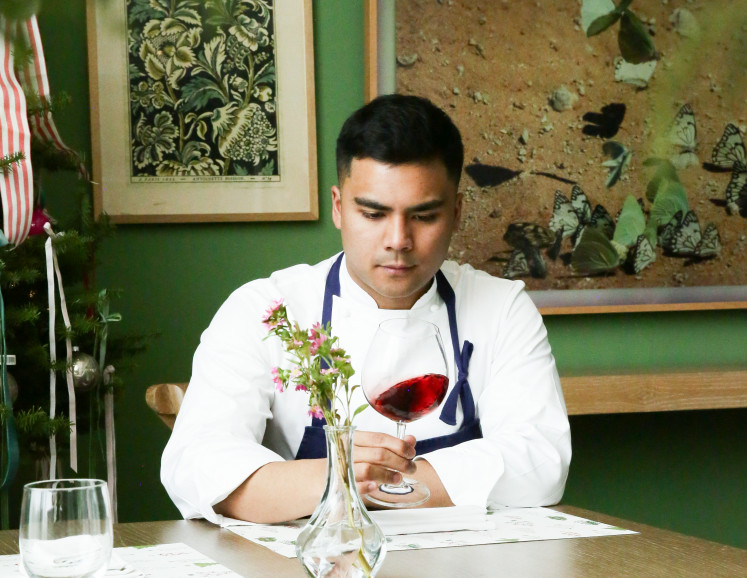Popular Reads
Top Results
Can't find what you're looking for?
View all search resultsPopular Reads
Top Results
Can't find what you're looking for?
View all search resultsEssay: Gold dust moments
The term “gold dust” is used as a metaphor for fragility, as well as the emotional intensity of precious memories triggered by sensorial experiences associated with these events.
Change text size
Gift Premium Articles
to Anyone
I
was staring at a painting called Moments are the gold dust of time by the artist Miriama Schniererova on her website mirindish.com, while listening to a song called “Gold Dust” by Tori Amos, with the lyrics singing “sights and sounds pull me back down another year ... I was here.”
The term “gold dust” is used as a metaphor for fragility, as well as the emotional intensity of precious memories triggered by sensorial experiences associated with these events. We want to hold on to it yet it keeps slipping through our fingers.
Memory records events and people in a vivid manner inside a little box in our brains. We can unlock the drawer, as long as our brains still function properly, by exposing ourselves to the sights and sounds and smells and the ambiance of a place we have been at different times, and then feeling what we felt at that particular time.
Events and people who have gone never really left you; their influence has somehow been tattooed on to your “body map.”
This year, I made a couple of visits to a place where I used to work as a teacher from 2011 to 2012, the Gandhi Memorial Intercontinental School (GMIS), to write a promotional piece. I had been thinking about the school, its library, the students and my colleagues a lot since I left in December 2012. So I was very happy to go back there.
I took these trips at a time when I was physically and mentally drained, climbing the ladder of the journalistic and literary fields. Some people who work in these two fields are highly competitive and ambitious, working almost around-theclock to chase their ambitions to the grave, associating only with people who can help them achieve their ambitions. This is why the opportunity to find true friends in these fields, where everyone thinks only of advancing their careers, is extremely hard.
I was tired, confused and lonely. My getting back in touch with my roots in the education world has given me the rejuvenation that I needed.
The moment I walked into the school’s hallway in late January at 6:50 a.m., I felt like I had been transported back five years. The sights of the indoor football field, the distinctive smell of the building, the sight of students and teachers rushing to put their stuff in the classrooms/teacher rooms to return to the indoor field and take part in the morning assembly, accompanied by some instrumental music played by teachers who had rehearsed for the morning ’s accompaniment. I’d been here before.
When I conversed with my former supervisors and colleagues, I started to remember why my stint of working in the school at the age of 22 served as a very important element in my intellectual and emotional growth as an individual.
I was fresh out of university at that time, getting a chance to apply my knowledge into real-life practices. I learned a lot of things while working for the school. I picked up my English speaking and writing abilities there, having to work with students and teachers from all over the world, including India, the Philippines, Korea, China and South Africa. Interacting with so many people from all over the world also opened my mind and introduced me to a new way of thinking.
It was around that time, sparked by discussions with my neighbor, Debra H. Yatim, that I started to explore the fields of literature, journalism and the arts. The school’s library was my sanctuary during my teaching years, exploring and reading so many books on these subjects. I loved exchanging ideas and having discussions with my students and fellow teachers. To see the courage of my students to constantly learn something new was very inspiring for me.
I now remember what made me so happy at that time: I felt at home there. As somebody who came from a broken home and who was bullied and rejected by most people, I have this constant yearning to feel like I belong someplace, like I am a part of some community. I found this at GMIS.
And I remember the real reason why I write. I write to connect with other human beings. I am happy when these writings spark discussions or open new channels of friendship. To be honest, these few months I have strayed from this true intention, getting caught up in the definition of success set by senior writers and some contemporaries of mine who think that you have to be well-known and acclaimed to be considered and truly valued as a writer. No wonder I’ve been frustrated: I was fooled into believing the illusions that my seniors and contemporaries see as “success,” namely fame, association with powerful people and being commissioned for a large quantity of projects.
Well, I don’t subscribe to their definition of success. My trip has allowed me to step back from the hustle-and-bustle of trying to make it in both the journalistic and literary fields and, again, it forced me to remember why I write. Awards, the approval of seniors and fame are no longer important. When a colleague in the office comes to me to discuss a piece of writing, that’s what’s really makes me happy instead of praise. I also think of sharing my experiences with young students so that they can also spread ideas that matter.
Thanks to this “sentimental journey” to GMIS, I can be content and happy again. My life may be modest, but I am striving to do things that I enjoy the most: writing and connecting with other people through the exchange of ideas. Forming true friendships with people who are low-key yet fascinating — instead of false relationships with the “fake” and frequently arrogant high profiles.
The crazy thing is, the gold that you find, you find it when you’re not even looking for it. You turn around and somebody is offering you a plate of traditional snacks while having a discussion over coffee somewhere and … its heaven. It doesn’t get any better than that!











